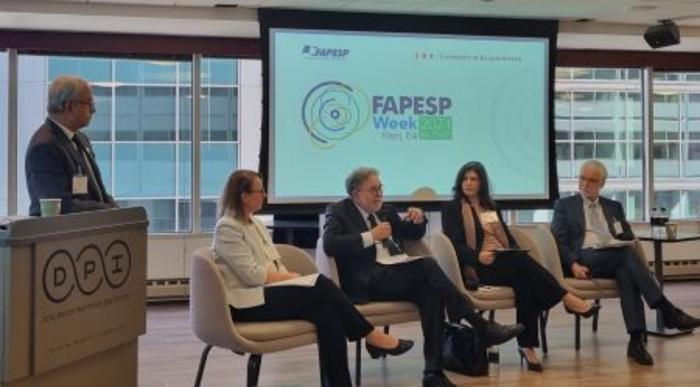A delegation of more than 20 researchers from universities and research institutions in the state of São Paulo (Brazil) is participating in a series of panel discussions presenting their lines of research and technical visits at the University of Illinois (United States) until Friday (April 12). The meetings are part of the program for FAPESP Week Illinois, which opened on April 9 in Chicago, at the headquarters of the Discovery Partners Institute (DPI) of the University of Illinois System (UIS) – composed of the universities of Illinois in Chicago, Urbana-Champaign and Springfield.

Credit: Elton Alisson/Agência FAPESP
A delegation of more than 20 researchers from universities and research institutions in the state of São Paulo (Brazil) is participating in a series of panel discussions presenting their lines of research and technical visits at the University of Illinois (United States) until Friday (April 12). The meetings are part of the program for FAPESP Week Illinois, which opened on April 9 in Chicago, at the headquarters of the Discovery Partners Institute (DPI) of the University of Illinois System (UIS) – composed of the universities of Illinois in Chicago, Urbana-Champaign and Springfield.
The goal of the event is to create new opportunities for scientific and technological cooperation between researchers from the state of São Paulo and the Midwest of the United States in areas such as health and medicine, sustainable cities, smart agriculture, climate, bioenergy, and investing in democratic institutions.
“Through FAPESP Week, we hope to create opportunities for joint research projects between researchers from the state of São Paulo and other countries, as well as to establish strategic relationships,” said Carlos Américo Pacheco, Director-President of the Foundation’s Technical-Administrative Council (CTA), at the opening of the event.
Another objective of the series of international events promoted by FAPESP since 2011 is to catalyze multidisciplinary research collaborations to address the main global challenges, he stressed.
“We face global challenges in many areas, such as climate change and food insecurity, that require a different kind of collaborative approach between institutions and different fields of knowledge to foster transdisciplinary research,” said Pacheco.
Some areas of interest in transdisciplinary collaborative research with Brazil to help address global challenges are public health, workforce development, democracy, digital infrastructure, and sustainability, said Timothy Killeen, President of the University of Illinois.
“Our relationship with Brazil is based on a long legacy that began when the first dean of the University of Illinois College of Agriculture [Eugene Davenport] went to Brazil [back in the 19th century] and helped establish one of the country’s first agricultural colleges [the Luiz de Queiroz College of Agriculture of the University of São Paulo]. We want to rejuvenate that relationship in areas such as the circular bioeconomy, food and agricultural technologies, sustainability, and workforce development. We want excellence, but also to promote social inclusion,” he said.
According to the leader, the Discovery Partners Institute of the University of Illinois System is the result of a USD 100 billion investment made by the state of Illinois in recent years in global engagement and the search for solutions aimed at workforce development in the region.
“The goal of the DPI, like FAPESP Week, is to catalyze scientific and technological collaboration with partner institutions around the world. The complex social problems we face today, related to climate, health, water and food, transcend borders. That’s why we need to collaborate across disciplinary, geographical, social and political boundaries,” said Deba Dutta, Acting Director of the DPI.
This vision is also shared by the US National Science Foundation (NSF), said Kendra Sharp, head of the institution’s Office of International Science and Engineering.
“We all agree on the importance of international and interdisciplinary collaborations to solve global challenges. We cannot solve these problems alone, within our national borders. And the NSF, which is a federal agency with a budget of USD 9 billion that funds much of the basic and applied research, believes strongly in this,” Sharp said.
According to Viviane Prado Sabbag, Deputy Consul General of the Brazilian Consulate General in Chicago, international research collaboration is the link between diplomacy and science.
“It’s become clear to us that all the main issues in Brazil’s international relations today are related to the development of science and technology. That’s why, in recent years, we’ve developed a program of innovation diplomacy in order to have a more structured diplomacy in relation to scientific and technological research,” she said.
During the opening of FAPESP Week Illinois, the Brasillinois program was also launched.
The initiative aims to create a new model of research collaboration between Brazil and the University of Illinois System by building research connections in areas such as climate and sustainability, medicine and public health, and social inclusion (read more at: https://fapesp.br/week/university-of-illinois-plans-new-model-for-research-collaboration-with-brazil).
More information about FAPESP Week Illinois is available at: fapesp.br/week/2024/illinois.



